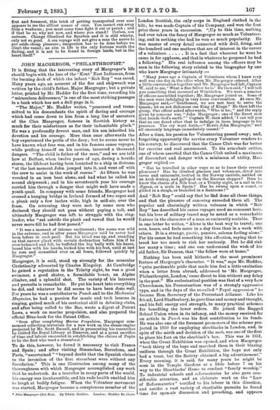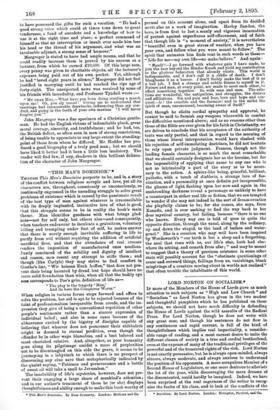JOHN MACGREGOR, "PHILANTHROPIST."
IT is fitting that the interesting story of Macgregor's life should begin with the loss of the • Kent' East Indiaman, from the burning deck of which the infant "Rob Roy" was saved.
Many years ago, an account of the fire and shipwreck was written by the child's father, Major Macgregor; but a private letter, printed by Mr. Hodder for the first time, recording his "miraculous deliverance," is one of the most striking passages in a book which has not a dull page in it.
"The Major," Mr. Hodder writes, "possessed and trans.
mitted to his descendants the spirit of daring and courage which had come down to him from a long line of ancestors of the Clan Macgregor, famous in Scottish history as much for their misfortunes as for their indomitable pluck."
He was a profoundly devout man, and his son inherited his devotion and his courage. More than once afterwards the boy experienced the perils of the deep ; but he seems never to have known what fear was, and in his famous canoe voyages, while priding himself on his caution, incurred a thousand dangers. " The child is father of the man," and we are told how at Belfast, when twelve years of age, during a terrific storm, the lifeboat having been launched to a ship in distress, "at the last moment John jumped into it, and went off with the crew to assist in the work of rescue." At fifteen he was wrecked in an iron boat alone, and had what he called his second shipwreck ; and in his seventeenth year his courage carried him through a danger that might well have made a youth quail. In company with some friends, Macgregor had crossed a hanging bridge in Ireland formed of two ropes and a plank only a few inches wide, high in mid-air, over the foam. On returning they were met by some men who declared they should not pass without paying a toll, and ultimately Macgregor was left to struggle with the ring. leader, who "sat astride the plank and vowed that he would never move till he had first passed."
" It was a moment of intense excitement; the scene was wild in the extreme, and in after years Macgregor said he never had been before in such peril. But his blood was up, and standing on that narrow plank with certain destruction before him if he over-balanced and fell, he buffeted the big bully with his knees, boxed him with his hands, kicked him with his feet, until at last he rose and scrambled over on all fours, followed quickly by Macgregor."
Macgregor, it is said, stood up strongly for the muscular Christianity advocated by Charles Kingsley. At Cambridge he gained a reputation in the Trinity eight, he was a good swimmer, a good skater, a formidable boxer, an Alpine
climber, and a splendid shot. The variety of his interests and pursuits is remarkable. He put his heart into everything he did, and whatever he did seems to have been done well. Foiyears he was a contributor to Punch and to the Mechanics' Magazine, he had a passion for music and took lessons in singing, gained much of his oratorical skill in debating clubs, and after being called to the Bar, wrote a digest of Patent Laws, a work on marine propulsion, and also prepared the official Blue-book for the Patent Office.
"Soon after completing Marine Propulsion, Macgregor com- menced collecting materials for a new work on the steam-engine projected by Mr. Scott Russell, and in prosecuting his researches he visited the Royal Library at Hanover, and at a great sacrifice of time and labour succeeded in establishing the claims of Pepin to be the first who used a steamboat."
To do this, however, he found it necessary to visit France and Spain ; and after visiting Simanchas, Barcelona, and Paris, "ascertained " "beyond doubt that the Spanish claims to the invention of the first steamboat were without any foundation." This is one illustration among many of the thoroughness with which Macgregor accomplished any work that he undertook. As a traveller in many parts of the world, his energy was inexhaustible, and his rude health enabled him to laugh at bodily fatigue. When the Volunteer movement was started, Macgregor became a conspicuous member of the
• JektrMaegregor (Rob RM. By Edwin Hodder. London: Hodder Brothers.
London Scottish, the only corps in England clothed in the kilt; he was made Captain of the Company, and won the first prize three years in succession. ",Up to this time, nothing had ever taken the fancy of Macgregor so much as Volunteer- ing, and in nothing else had he won so much popularity. He was master of every detail connected with drill, firing, and the hundred and one matters that are of interest in the career of a volunteer It is a fact that wherever he went he came in for applause, and that in whatever he proposed he had a following." His real influence among the officers may be seen in the following story related to the biographer by one who knew Macgregor intimately :—
" Many years ago a Captain of Volunteers whom I knew very well was one day in the office when Mr. Macgregor entered. After a little conversation together and Mr. Macgregor had left, Captain W. said to me, What a fine fellow he is.' He then said,' I will tell you something that occurred at Wimbledon. We were a number of officers assembled together; Mr. Macgregor joined us. Some of the men were indulging in very loose conversation. At once Mr. Macgregor said,—" Gentlemen, we are met here to serve the Queen; let ns not dishonour our King of Kings." He then left the group. One officer asked afterwards, " Who is he; " and the reply given by someone was, "John Macgregor; one of the finest men that treads God's earth." ' Captain W. then added,' I can tell you that no one dared after that to indulge in loose language in his presence. The cry went forth,—" Here's John Macgregor," and all unseemly language immediately ceased."
After a time, his passion for Volunteering passed away ; and, forgetting apparently the service every Volunteer renders to his country, he discovered that the Canoe Club was far better for exercise and real amusement. To his arm-chair critics, one of whom asserted that the Canoe Club united a maximum of discomfort and danger with a minimum of utility, Mac- gregor replied :-
" Has he travelled in other ways so as to know their several pleasures ? Has he climbed glaciers and volcanoes, dived into caves and catacombs, trotted in the Norway carriole, ambled on an Arab donkey, and galloped on the Russian steppes ? Does be know the charm of a Nile boat, or a Trinity eight, or a sail in the h]gean, or a mule in Spain ? Has he swung upon a camel, or glided in a sleigh, or trundled in a Rantoone "
And "Rob Roy" could say that he Had done all these things, and that the pleasure of canoeing exceeded them all. The popular and charmingly written volumes in which "Rob Roy" has described his canoe voyages need no comment here,
but his love of solitary travel may be noted as a remarkable feature in the character of a man so eminently sociable. Thus in one letter he writes, "Alone is the best way to travel; one sees, hears, and feels more in a day thus than in a week with others. It is a strange, poetic, pensive, solemn feeling alone." For his canoe he had something like affection, saying that he loved her too much to risk her uselessly. But he did risk her many a time ; and one can understand the wish of his
father, Sir Duncan, that "the fellow were at home."
Nothing has been said hitherto of the most prominent feature of Macgregor's character. " It was," says Mr. Hodder, "quite pardonable pride that made him feel a little exultation when a letter from abroad, addressed to Mr. Macgregor, Philanthropist, London,' came direct to him without any delay in the post." His ecclesiastical position was that of a very Low Churchman, his Protestantism was of a strongly aggressive
type, and in the days of the so-called "Papal aggression" he became Hon. Secretary of the Protestant Alliance. Like his friend, Lord Shaftesbury, he gave time and money and thought, and his full energy and strength, to many practical schemes for benefiting the lower orders. He joined the Ragged
School Union when in its infancy, and the money received for an article in Punch was his first contribution to its funds. He was also one of the foremost promoters of the scheme pro- jected in 1850 for employing shoeblacks in London, and, in spite of the mirth and derision of the mob, was one of the first to place his foot on the shoeblack's box. This was in 1851, when the Great Exhibition was opened, and when Macgregor "took thirty of the boys and marched them in their blazing uniform through the Great Exhibition, the boys not only had a treat, but the Society obtained a big advertisement?' Every morning, it is said, for many years he might be seen in the Temple Gardens at a little before 7 on his way to the Shoeblacks' Home to conduct "family worship." To industrial schools and reformatories he also gave con- siderable attention, and an elaborate work on the "Law of Reformatories" testified to his labour in this direction, and amidst a vast variety of charitable pursuits he found time for open-air discussion and preaching, and appears to have possessed the gifts for such a vocation. "He had a good strong voice which could at times tone down to great tenderness, a fund of anecdote and a knowledge of how to use it at the right time and place; a perfect command of himself so that no interruption or insult ever made him lose his head or the thread of his argument, and what was an invaluable adjunct, a strong sense of humour."
Macgregor is stated to have had ample means, and that he could readily increase them is proved by his success as a lecturer, from which he earned £10,000. Of this large sum, every penny was given to charitable objects, all the lecturer's expenses being paid out of his own pocket. Yet, although he had "loved eight years in silence," Macgregor did not feel justified in marrying until he had reached the ripe age of forty-eight. The unexpected news was received by some of his friends with incredulity, and Professor Tyndall wrote :-
" My DEAR MAC,—What have you been doing stealing a march upon me ! Oh, you sly rascal ! Giving me to understand that marriage had innumerable drawbacks, influencing thus my con- duct, and going in the teeth of your own maxims. ' I will never forgive you."'
John Macgregor was a fine specimen of a Christian gentle- man. He had the English virtues of indomitable pluck, great moral courage, sincerity, and truthfulness ; and he had, too, the British defect, so often seen in men of strong convictions, of being unable to appreciate to any large extent the standing- point of those from whom be differed. Mr. Hodder has pro- duced a good biography of a truly good man ; but we should have liked it better had it been a little less laudatory. The reader will find few, if any, shadows in this brilliant delinea- tion of the character of John Macgregor.



































 Previous page
Previous page